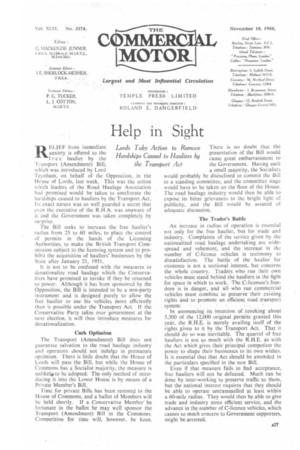Help in Sight
Page 29

If you've noticed an error in this article please click here to report it so we can fix it.
Lords Take Ac lion to Remove Hardships Cause d to Hauliers by the T ran sport Act
RELIEF from immediate anxiety is offered to the f ree haulier by the Transport (Amendment) Bill, which was introduced by Lord Teynhatri, on behalf of the Opposition, in the House of Lords, last week. This was the action which leaders of the Road Haulne Association had promised would be taken, to ameliorate the hardships caused to hauliers by the Transport Act. Its exact nature was so well guarded a secret that \•en the executive of the R.H.A. was unaware of it and the Government was taken completely by surprise.
The Bill seeks to increase the free haulier's radius from 25 to 60 miles, to place the control of permits in the hands of the Licensing Authorities, to make the British Transport Commission subject to the licensing system and to prohibit the acquisition of hauliers' businesses by the State after January 21, 1951.
It is not to be confused with the measures to denationalize road haulage which the Conservatives have promised to invoke if they be returned to power.. Although it has been sponsbred by the Opposition, the Bill is intended to be a non-party instrument and is designed purely to allow the free haulier to use his vehicles more efficiently than is possible under the Transport Act: If the Conservative Party takes over government at the next election, it will then introduce measures for denationalization.
Curb Optimism The Transport (Amendment) Bill does not guarantee salvation to the road haulage industry and operators should not indulge in premature optimism. There is little doubt that the House of Lords will pass the Bill, but while the House of Commons has a Socialist majority, the measure is unlikela to be 'adopted: The only method of introducing it into the LoWer Hatise is by means of a Private Member's Bill.
Time for private Bills has been restored to the HouSe of Commons, and a ballot of Members will be held shortly. If a Conservative Member be fortunate in the ballot he may well sponsor the Transport (Amendment) Bill in the Commons, Competition for time will, however, be keen. There is no doubt that the presentation of the Bill would cause great embarrassment to the Government. Having such a small majority, the Socialists would probably be disinclined to commit the Bill to a standing committee, and the committee stage would have to be taken on the floor of the House. The road haulage industry would then be able to expose its bitter grievances to the bright light of publicity, and the Bill would be assured of adequate discussion.
The Trader's Battle An increase in radius of operation is essential not only for the free haulier, but for trade and industry. Complaints of the service given by the nationalized road haulage undertaking are widespread and vehement, and the increase in the. number of C-licence vehicles is testimony to dissatisfaction. The battle of the haulier for existence is not a sectional interest, but concerns the whole country. Traders who run their own vehicles must stand behind the hauliers in the fight for space in which to work.. The C-licensee's freedom is in danger, and all who run commercial vehicles must combine to preserve their existing rights and to-promote an efficient road. transport system; ' In announcing its intention of ,reVoking about 5,300 of the 12,000 original permits granted this Year, the R.H.E. is merely availing itself of the rights given to it by the Transport Act. That it should do so was inevitable. The quarrel of free hauliers is not so much with the R.H.E. as with the Act which gives their principal competitor the power to shape their businesses to its own wishes. It is essential that that Act should be amended in the particulars specified in the new Bill.
Even if that measure fails to find acceptance, free hauliers will not be defeated. Much can be done by inter-working to preserve traffic to them, but the national interest requires that they should be able to operate untrammelled at least within a 60-mile radius. They would then be able to give trade and industry more efficient service, and the advance in the number of C-licence vehicles, which causes so much concern to Government supporters, might be arrested.




















































































